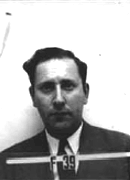Robert Marshak
Robert Eugene Marshak (born October 11, 1916 in the Bronx , New York City , † December 23, 1992 in Cancún , Mexico ) was an American theoretical physicist.
Life
Marshak was the son of poor Jewish immigrants from Minsk , won numerous prizes at school and studied at the City College of New York (which was free of tuition) and with a Pulitzer scholarship at Columbia University , where he a. a. studied with Isidor Isaac Rabi (initially mathematics and philosophy) and obtained his master’s degree in physics in 1936 . He then went to Cornell University , where he in 1939 Hans Bethe with a thesis on the energy production in white dwarfs doctorate was. The work in which he showed that their energy could not come from hydrogen fusion, won him the Morrison Prize. He also worked with Bethe on other problems related to the astrophysics of stars.
During the Second World War he was at the Radiation Laboratory of the Massachusetts Institute of Technology (MIT), which dealt with radar development , the Canadian-British atomic bomb project in Montreal and the Manhattan project in Los Alamos , where he a. a. Shock waves at the very high temperatures of an atomic bomb explosion, in which the majority of the matter was converted into radiation, treated ("Marshak waves"). After the war, however, he co-founded the Federation of American Scientists in 1947 , which worked towards test-stop agreements and advocated the non-proliferation of nuclear weapons.
At the same time he went to the University of Rochester , where he became a professor and from 1950 chairman of the physics department. During his time in Rochester, he was the driving force behind the construction of their cyclotron accelerator and the annual Rochester Conferences on elementary particle physics that took place from 1950 onwards . They took place in Rochester until 1957, later in different countries as the International Conference on High Energy Physics. From the beginning, Marshak also ensured that members from the Soviet Union, whom he visited regularly, participated. Because of his numerous international contacts, he was one of the founders of the International Center for Theoretical Physics in Trieste , on whose Science Council he was from 1965 to 1975 and 1984 to 1992. After falling out over questions of how to deal with Vietnam War protests with the conservative university president Wallis , he left Rochester in 1970 and was president of the City College of New York until 1979 . In 1979 he became a professor at the Virginia Polytechnic Institute , where he retired in 1992 . He died in a swimming accident in Mexico.
In 1979 he became Vice President and 1983 President of the American Physical Society . He has been a member of the US National Academy of Sciences since 1958 , the American Academy of Arts and Sciences since 1961, and the American Philosophical Society since 1983 . He was an Alexander von Humboldt Prize winner and three times Guggenheim Fellow .
His students include Rabindra Mohapatra and George Sudarshan .
His son Stephen Marshak is a geologist.
plant
Marshak worked in nuclear physics , elementary particle physics , and astrophysics . He is best known as an independent discoverer of the VA theory of weak interactions , along with his graduate students George Sudarshan (1957) and independent of Richard Feynman and Murray Gell-Mann . In 1947, with Hans Bethe, he was also one of the first to recognize the existence of the particle later known as the muon (then called the meson) independently of the pion , the exchange particle of the strong interaction (two-meson hypothesis).
Fonts
- with EC Nelson and Leonard Schiff: Our atomic world . University of New Mexico Press, Albuquerque 1947
- Meson Physics . McGraw Hill 1952
- with Sudarshan: Elementary Particle Physics . Wiley, New York 1961
- with Riazzudin and Ryan: Theory of weak interactions in particle physics . Wiley 1969
- Conceptual foundations of modern particle physics . World Scientific 1993
literature
- Sudarshan (Editor): A gift for prophecy - essays in celebration of the life of Robert Marshak . World Scientific 1994
- Obituary by Lustig, Okubo, Sudarshan: Robert Marshak . In: Physics Today . November 1993
Web links
- Literature by and about Robert Marshak in the catalog of the German National Library
- Biography in the Virginia Tech Digital Library
- Biography of Henley, Lustig, Biographical Memoirs National Academy of Sciences
- Biography at the APS
Notes and sources
- ^ Marshak: The internal temperature of white dwarfs . In: Astrophysical Journal . Volume 92, 1940, p. 321
- ↑ Bethe and Marshak: Physics of stellar interiors and stellar evolution . In: Reports on Progress in Physics . Volume 6, 1939
- ^ Member History: Robert E. Marshak. American Philosophical Society, accessed October 29, 2018 .
- ^ Marshak and Sudarshan: Chirality invariance and the universal Fermi interaction . In: Physical Review . Volume 109, 1958, p. 1860, lecture by Marshak at the Padua-Venice conference on elementary particles in November 1957, Nature of the four fermion interaction
- ↑ Bethe and Marshak: On the two meson hypothesis . In: Physical Review . Volume 72, 1947, p. 506
| personal data | |
|---|---|
| SURNAME | Marshak, Robert |
| ALTERNATIVE NAMES | Marshak, Robert Eugene (full name) |
| BRIEF DESCRIPTION | American theoretical physicist |
| DATE OF BIRTH | October 11, 1916 |
| PLACE OF BIRTH | Bronx , New York City |
| DATE OF DEATH | December 23, 1992 |
| Place of death | Cancun , Mexico |
